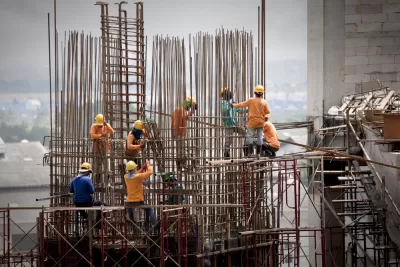A study from economist David Autor finds that the higher wages once offered workers without college degrees or special skills are mostly gone. Workers in cities often earn what they would in rural areas.

City boosters have long touted dense urban cities as places of opportunity. A new study finds that for low-skilled workers that may no longer be the case. An analysis of wages through time shows that, for less educated workers, the gap between pay in rural and urban areas has shrunk dramatically. "Because of this, cities no longer offer low-skilled workers the economic advantages they once did, according to new analysis by the M.I.T. economist David Autor," Emily Badger and Quoctrung Bui report for the New York Times.
Many policy makers and economists have mused that if Americans moved more they would be able to improve their incomes and have access to more opportunities. This study suggests that for many, that’s not the case, in part because of the decrease in manufacturing, the urban wage advantage is now only available for the professional class of Americans.
"Now, the urban jobs available to people with no college education — as servers, cleaners, security guards, home health aides — are basically the same kind as those available in smaller towns and rural communities," Badger and Bui write. Meanwhile, the cost of living in these denser communities are often much more expensive.
FULL STORY: What if Cities Are No Longer the Land of Opportunity for Low-Skilled Workers?

Alabama: Trump Terminates Settlements for Black Communities Harmed By Raw Sewage
Trump deemed the landmark civil rights agreement “illegal DEI and environmental justice policy.”

Study: Maui’s Plan to Convert Vacation Rentals to Long-Term Housing Could Cause Nearly $1 Billion Economic Loss
The plan would reduce visitor accommodation by 25% resulting in 1,900 jobs lost.

Why Should We Subsidize Public Transportation?
Many public transit agencies face financial stress due to rising costs, declining fare revenue, and declining subsidies. Transit advocates must provide a strong business case for increasing public transit funding.

Paris Bike Boom Leads to Steep Drop in Air Pollution
The French city’s air quality has improved dramatically in the past 20 years, coinciding with a growth in cycling.

Why Housing Costs More to Build in California Than in Texas
Hard costs like labor and materials combined with ‘soft’ costs such as permitting make building in the San Francisco Bay Area almost three times as costly as in Texas cities.

San Diego County Sees a Rise in Urban Coyotes
San Diego County experiences a rise in urban coyotes, as sightings become prevalent throughout its urban neighbourhoods and surrounding areas.
Urban Design for Planners 1: Software Tools
This six-course series explores essential urban design concepts using open source software and equips planners with the tools they need to participate fully in the urban design process.
Planning for Universal Design
Learn the tools for implementing Universal Design in planning regulations.
Smith Gee Studio
Alamo Area Metropolitan Planning Organization
City of Santa Clarita
Institute for Housing and Urban Development Studies (IHS)
City of Grandview
Harvard GSD Executive Education
Toledo-Lucas County Plan Commissions
Salt Lake City
NYU Wagner Graduate School of Public Service




























